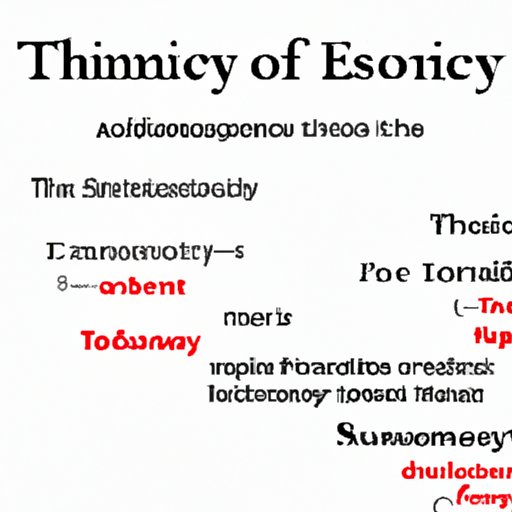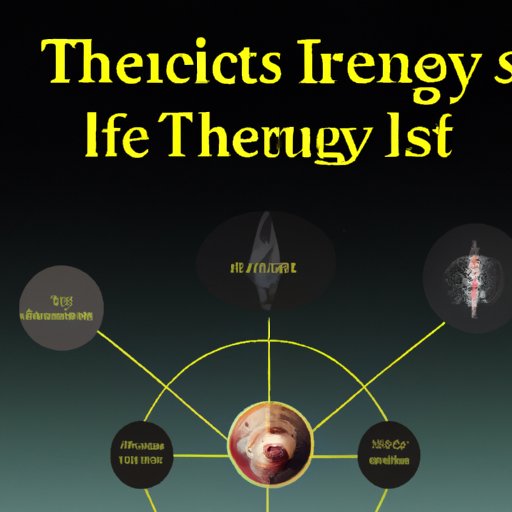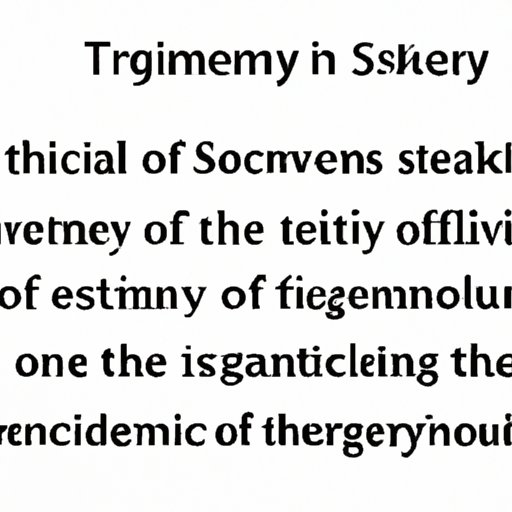Introduction
A scientific theory is a set of ideas or facts that explain a phenomenon or a set of phenomena. It is an explanation based on observations and experiments that are backed up with evidence. The purpose of this article is to explore what a scientific theory is, how it develops, and its role in modern science.

Exploring the Definition of a Scientific Theory: What it is and How it Develops
A scientific theory is a well-tested explanation for a wide range of phenomena. It is an explanation of natural phenomena that is supported by evidence and reasoning. A scientific theory can be used to make predictions about new situations and to develop new technologies. It is often used to explain complex relationships between different variables.
The development of scientific theories is a long process. It begins with observation and data collection, followed by hypothesis formation, experimentation, and finally, confirmation or rejection of the hypothesis. Scientists use the scientific method to test their hypotheses and draw conclusions about the phenomena being studied. They also use mathematical models and computer simulations to further support their theories.
Some examples of scientific theories include the theory of evolution, the theory of relativity, and the big bang theory. These theories have been tested over time and are accepted as reliable explanations for how the universe works.

A Deep Dive into the History of Scientific Theories and Their Impact on Society
Ancient philosophers such as Aristotle, Plato, and Socrates laid the foundation for modern science by developing theories to explain natural phenomena. They used observations and logical arguments to form theories about the world around them. For example, Aristotle proposed the theory of four elements – earth, water, air, and fire – which he believed to be the building blocks of all matter.
The scientific revolution of the 16th and 17th centuries marks the beginning of modern science. During this period, scientists such as Copernicus, Galileo, and Newton developed theories that challenged traditional beliefs about the universe. Their discoveries led to the development of more accurate theories about the laws of nature. These theories had a profound impact on society, leading to the emergence of new technologies and ways of thinking.
Today, scientific theories continue to shape our understanding of the world. They provide us with a way to explain complex phenomena and to make predictions about the future. They also inform policies and decisions made by governments and organizations.

Examining the Role of Scientific Theories in Science Education
Understanding the role of scientific theories in science education is essential for teaching students about the scientific process. Teaching scientific theories helps students understand how scientific knowledge is acquired and how it is used to solve problems and make decisions. It also encourages them to think critically and creatively about the world around them.
Teaching scientific theories in schools requires teachers to provide students with opportunities to learn about the scientific process. This includes providing students with resources and activities to help them better understand the theories. Teachers should also encourage students to ask questions and engage in discussions about the theories.
The benefits of teaching scientific theories in schools include improved problem solving skills, increased critical thinking skills, and enhanced creativity. Students who learn about scientific theories are better prepared to face the challenges of the modern world.
An Overview of the Various Types of Scientific Theories and Their Applications
Scientific theories can be divided into three broad categories: physical theories, biological theories, and social theories. Physical theories are used to explain the behavior of matter and energy. Examples include the theory of gravity and the theory of relativity. Biological theories are used to explain the behavior of living organisms. Examples include the theory of evolution and the germ theory of disease.
Social theories are used to explain the behavior of people and societies. Examples include the theory of social stratification and the theory of social exchange. Scientific theories can also be applied to other fields such as economics, engineering, and medicine. For example, the theory of supply and demand is used to explain economic behavior.
Investigating the Process of Formulating and Testing Scientific Theories
Formulating a scientific theory involves several steps. First, scientists must observe and collect data about the phenomenon they are studying. Next, they must formulate a hypothesis based on their observations. After that, they must design experiments to test the hypothesis. Finally, they must analyze the results and determine if the hypothesis is correct.
Testing scientific theories is an important part of the scientific process. Experiments allow scientists to confirm or reject their hypotheses and draw conclusions about the phenomenon being studied. They also allow scientists to make predictions about new situations. Testing scientific theories helps to ensure the accuracy of scientific knowledge.
The importance of testing scientific theories cannot be overstated. Without testing, scientific theories would remain untested assumptions. Testing allows scientists to refine their theories and develop new ones. It also provides a way to verify existing theories and detect errors in them.
Conclusion
In conclusion, a scientific theory is an explanation for natural phenomena that is supported by evidence and reasoning. It is developed through a long process of observation, hypothesis formation, experimentation, and analysis. Scientific theories have had a profound impact on society, informing policies and decisions made by governments and organizations. They also play an important role in science education, helping students understand the scientific process and encouraging them to think critically and creatively about the world around them. Finally, testing scientific theories is an essential part of the scientific process, ensuring the accuracy of scientific knowledge.
(Note: Is this article not meeting your expectations? Do you have knowledge or insights to share? Unlock new opportunities and expand your reach by joining our authors team. Click Registration to join us and share your expertise with our readers.)
